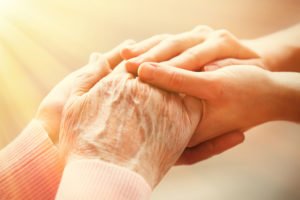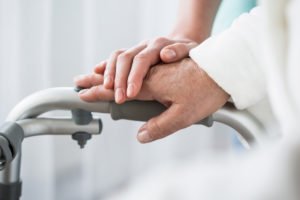
If you decided to move your family member to a nursing home, you most likely did so because they needed more care than your family could provide, and you wanted to make sure that your loved one would be in good hands. You expected the staff to be well-trained and attentive and to do their best to meet your relative’s needs. You certainly do not expect your family member to suffer abuse while living at a nursing home.
Unfortunately, nursing home abuse occurs frequently in facilities across the United States. The National Center on Elder Abuse (NCEA) found in a 2010 study that over half of all nursing home staff admitted to committing an act of abuse against an older patient within the previous year.
Elderly residents in nursing home facilities are particularly vulnerable because of physical and cognitive limitations. In addition, they often face isolation from their families. They may feel unable to report the abuse or afraid to do so.
If you suspect that a loved one suffered abuse in a nursing home, a Washington DC nursing home abuse lawyer could help you seek justice. Ben Crump Law, PLLC, has represented thousands of clients in personal injury cases. We can investigate what happened and work to seek financial compensation.
Call our office today at 800-959-1444 for a free case review with a team member.
Types of Nursing Home Abuse
Residents of nursing home facilities may experience different forms of abuse. Some may leave physical signs, while others may not. No matter the type of abuse, it can have devastating consequences.
Physical Abuse
Senior citizens in nursing homes may suffer physical abuse, such as hitting, pushing, kicking, and slapping. The abuse may leave victims with bruises, cuts, scrapes, and other physical injuries.
Staff members may withhold food or water as punishment for residents’ actions or perceived wrongdoing. Withholding food or water can have life-threatening consequences since nursing home residents are often frail and have serious medical problems.
Sexual Abuse
Sexual abuse in nursing homes happens more often than many people realize. It may include intercourse, inappropriate touching, forcing someone to watch or participate in sexual acts, sexually suggestive comments, and other behaviors.
If your loved one suffered sexual abuse, you might notice bleeding or bruising in the genital or anal area or the inner thighs. Since sexual abuse is not always physical, you may not see visible signs on your family member’s body. You may, however, notice changes in your loved one’s personality. They may become withdrawn, angry, anxious, or fearful, either in general or when their abuser is in the room.
Emotional Abuse
Employees who work with nursing home residents should be patient and understanding. Instead, staff members sometimes get frustrated or angry and lash out at the people in their care. Workers may shout or swear at residents, call them names, or humiliate them in front of other staff members or fellow residents. They may isolate seniors from other residents or make threats.
If your loved one has suffered emotional abuse, you may notice that they become quiet and withdrawn or seem anxious or fearful. Your loved one may eat less due to the emotional stress or experience significant weight loss.
A Washington DC nursing home abuse lawyer can help you pursue a claim for emotional abuse. Call Ben Crump Law, PLLC, today for a free case review with a team member.
Financial Abuse
Elderly residents have often accumulated sizable nest eggs. They may suffer from cognitive decline that makes it difficult for them to manage their financial affairs. Seniors who become isolated from their families may trust their caregivers for financial advice. Those factors can make nursing home residents susceptible to financial exploitation.
A staff member may offer to “help” a vulnerable person in a nursing home with financial matters, such as paying bills and depositing money in a bank account. The employee instead withdraws or transfers money from the resident’s account and commits financial abuse.
This type of abuse may be particularly difficult for family members to detect. You or another relative should monitor your loved one’s financial accounts, especially if they have dementia or Alzheimer’s disease. If a staff member takes your relative to a store or restaurant where your family member spends money, always request receipts. If you notice suspicious activity, it may warrant further investigation. A Washington DC nursing home abuse lawyer can help you with that investigation.
For a free legal consultation with a nursing home abuse lawyer serving Washington DC, call 800-712-9119
Responsibility for Nursing Home Abuse
In many cases, when nursing home residents suffer abuse, staff members often are responsible. However, fellow residents sometimes abuse vulnerable people who live alongside them. Seniors in nursing homes may also fall prey to visitors, such as delivery workers, maintenance and repair staff, and other residents’ family members and friends.
Washington DC Nursing Home Abuse Lawyer Near Me 800-712-9119
How a Washington DC Nursing Home Abuse Lawyer Can Help
The team at Ben Crump Law, PLLC, can investigate what happened to your loved one and who was responsible. We can speak with you and any family members or friends who witnessed possible signs of abuse. We can interview your relative, staff members, fellow residents, and others to determine what occurred.
If we learn that an employee was responsible, we can fight to hold that individual and the facility accountable. Often, nursing homes do not conduct thorough background checks before hiring employees. That can allow workers who abuse nursing home residents to move from one facility to another and prey on more victims. We may also discover that the nursing home failed to provide appropriate training for staff members to detect and respond to abuse.
If our investigation turns up evidence of abuse, our nursing home abuse lawyers can help you file a lawsuit seeking compensation for damages such as:
- Medical bills
- Money stolen from your loved one’s accounts
- Moving expenses to another facility
- The pain and suffering they experienced
Click to contact our Washington DC Personal Injury Lawyers today
Contact a Washington DC Nursing Home Abuse Lawyer
Ben Crump Law, PLLC, can work to hold those responsible for your loved one’s abuse accountable. Physical and emotional abuse are illegal under D.C. Code § 22–933. Financial exploitation of a vulnerable or older adult is a violation of D.C. Code § 22–933.01.
Your family has a limited window of opportunity to seek justice. Under D.C. Code § 12–301, the statute of limitations to file a personal injury lawsuit is three years (five years for sexual abuse). Contact Ben Crump Law, PLLC, today at 800-959-1444 to discuss your concerns with a staff member.
Call or text 800-712-9119 or complete a Free Case Evaluation form








